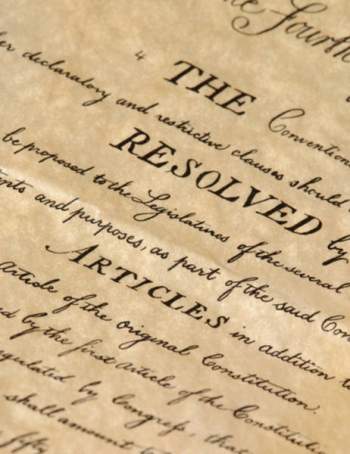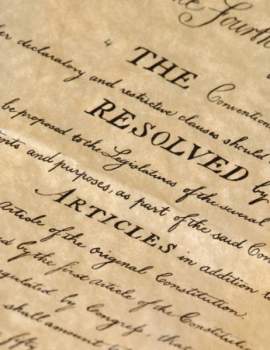
Understanding the 15th Amendment

Popular In Constitution
Purpose Of Lifetime Appointment And Pros And Cons Enumerated Powers Bicameral Legislature Background Article 3 Of The Constitution We The People 1st Amendment Who Wrote The Constitution Judicial Review Equal Protection Clause 5th Amendment 10th Amendment Three Fifths Compromise
The 15th Amendment is one that is considered to be one of the Reconstruction Amendments. It has close ties to the Fourteenth Amendment, which provides for a general definition of a citizen and enumerates certain rights. The 15th Amendment provides for protection to citizens by preventing the government--Federal, state, and local--from denying any citizen the right to vote based on race, color, or if they were bound to slavery in an earlier time.
The 15th Amendment was ratified on February 3rd, 1870, but certain states, such as Virginia, Mississippi, and Georgia, were required to ratify the Amendment in order to be recognized for representation in Congress.
Though the 15th Amendment was a revolutionary one in the sense that it would extend the rights of African-American citizens, its passage into law did not mean that the general population would thoroughly enforce the new legislation. The original draft of the 15th Amendment also included that the right to hold office would not be denied to any citizen based on race, color, or prior slave status. However, this provision would eventually be removed from the draft in order to ratify the 15th Amendment by the necessary 3/4 votes.
The protection guaranteed by the 15th Amendment can be argued to have been implemented to extend voting rights to African-Americans, for politicians were not necessarily or explicitly concerned with the rights of Irish and Chinese immigrants. That is not to say that the voting rights for African-Americans, though included into law, were observed in all the states.
In many of the Southern states, groups such as the Ku Klux Klan would employ violence and intimidation to deter many Black voters from exercising their rights. In many instances, many Blacks and even White Republicans were killed as a result, and many times with the help of law enforcement, either directly or by willingly not intervening.
Other ways in which many of the Southern states employed tactics to prevent African-Americans from reaching the voting polls were by imposing and administering literacy tests and poll taxes. Some states would go so far as making the locations to register to vote extremely hard to find or not easily available or accessible to Blacks.
Even though there was opposition to the inclusion and enforcement of the 15th Amendment by many, it was still a step forward in ensuring equal rights for all men under the United States Constitution. The first African-American to vote under the protection of the Fifteenth Amendment was Thomas Mundy Peterson, who cast his vote in Perth Amboy, New Jersey in a school board election.
The passage of the 15th Amendment also allowed for what at the time were radical programs to be created. Many states would implement public education systems, as well as laws preventing the prohibition of interracial marriage. Furthermore, between the years of 1865 and 1880, more blacks were elected to hold a public office than any other period in the United States. It is important to note, however, that no African-American governors were elected by any state.



















